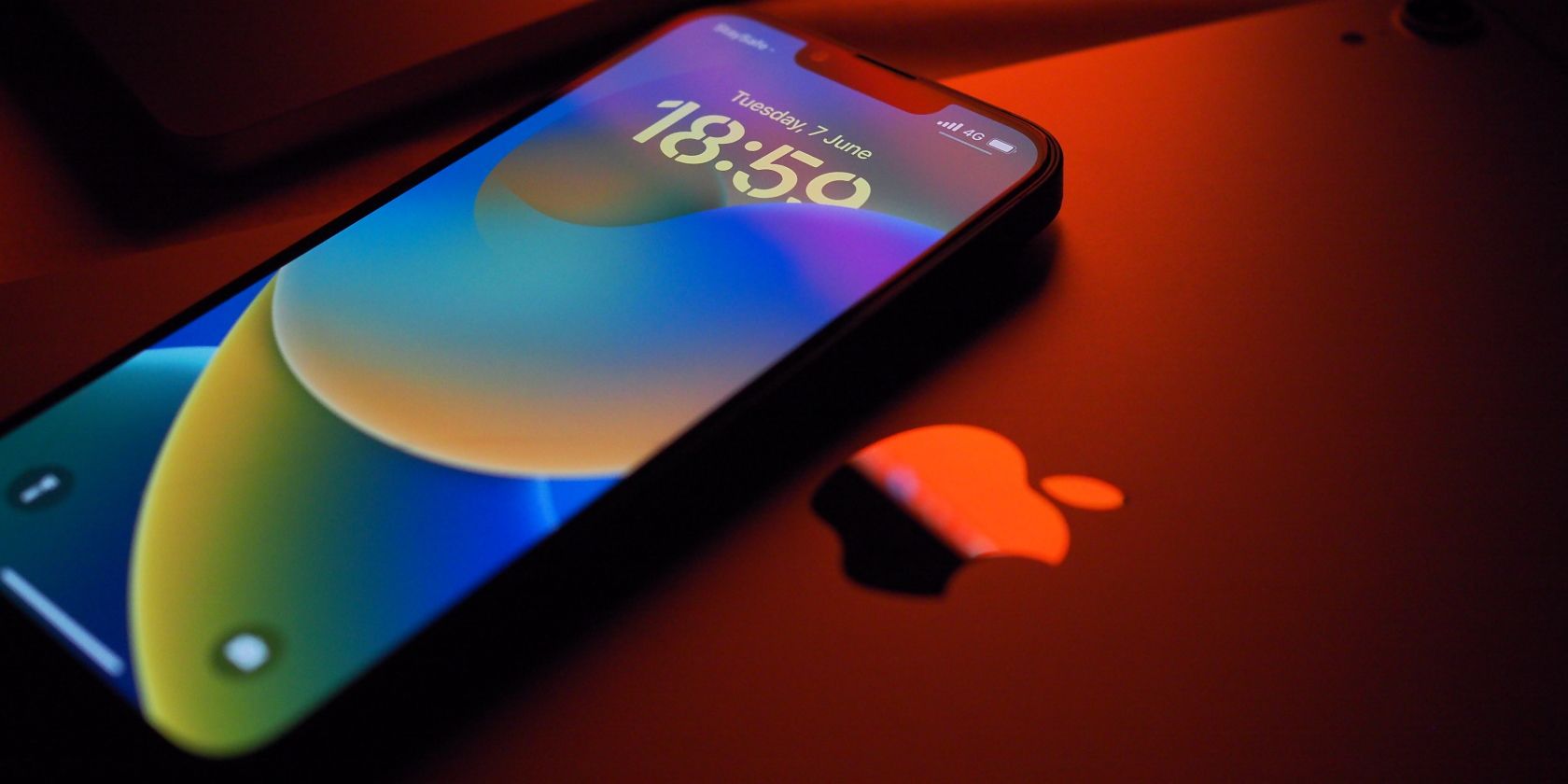
Kubuntu Ultimate Performance on IR16 Gen 2: The Seamless Linux Notebook Experience

Kubuntu Ultimate Performance on IR16 Gen 2: The Seamless Linux Notebook Experience
Key Takeaways
- The Kubuntu Focus Ir16 Gen 2 is a Linux-based laptop designed for developers, power users, and productivity enthusiasts.
- The laptop has a good selection of ports, including USB-C, USB-A, HDMI, and an SD card reader. However, it lacks an Ethernet port.
- The laptop runs on Kubuntu, a Linux distribution that offers a lot of customization and optimization features.
Sorting through the niche and varied world of pre-built Linux computers is a challenge. If you just need to get some work done, one notebook-class laptop making your choice a bit simpler is the Kubuntu Focus Ir16 Gen 2 . Its name doesn’t lie; giving it a try I found myself pretty focused.
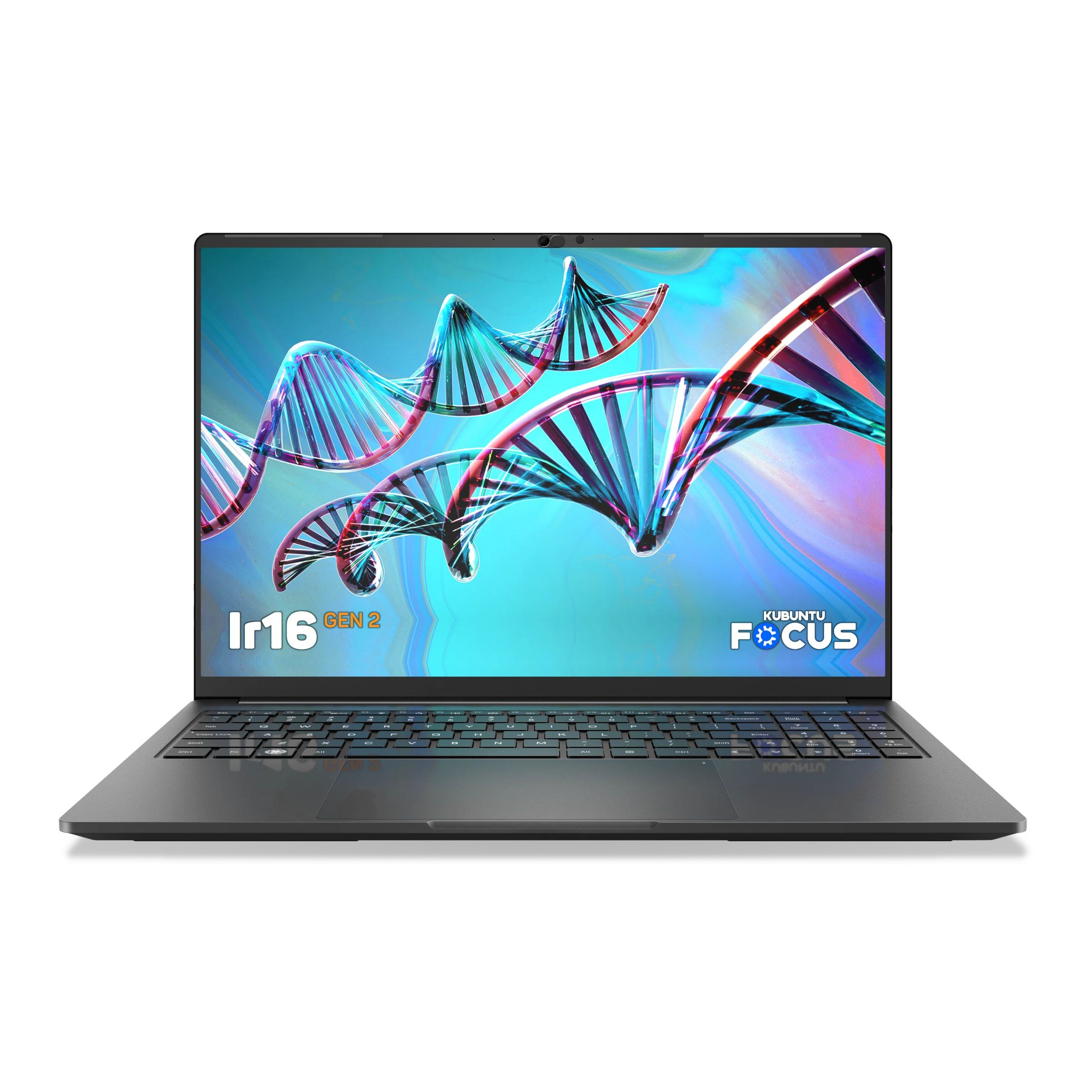

Kubuntu Focus Ir16 (Gen2)
8/ 10
The Ir16 GEN 2 marries the enterprise-class hardware from Carbon Systems with the meticulous OS integration and Linux-first support from Kubuntu Focus.
Pros
- Solid and user-serviceable build
- Good performance for an ultraportable
- Welcome guide makes transitioning to Kubuntu easier
- Decent battery life covers most of a workday
Cons
- Speakers and webcam are just OK
- Glass touchpad quickly gets visibly dirty
How We Test and Review Products
Price and Availability
Launched in June 2024, the Kubuntu Focus Ir16 Gen 2 follows its predecessor by upgrading the base RAM and storage configuration for the modern era and a newer processor. It’s also the first 16-inch edition of the model, alongside the established Ir14. All Kubuntu Focus products are made in a partnership between Kubuntu developers and California-based manufacturer Carbon Systems.
You can order the Kubuntu Focus Ir16 Gen 2 from the Kubuntu Focus website starting at $1,145, and shipping is free in the US and Canada. You’re free to customize your laptop with several options and accessories, including extra power supplies and a YubiKey security key pre-configured to unlock your Ir16.
Specifications
Operating System
Kubuntu
CPU
Intel Core i5-13500H
GPU
Intel Iris Xe (Integrated)
RAM
Up to 96GB
Storage
Up to 8TB
Battery
80Wh
Display (Size, Resolution)
16 in, 2,560 x 1,600
Speakers
2 x 2W
Memory
Dual Channel DDR5-4800 or DDR5-5200
Ports
USB-C, USB-A, HDMI, 3.5mm audio, SD card
Network
Wi-Fi 6E AX211
Dimensions
14.0 x 9.7 x 0.7in
Weight
3.3lbs
Webcam
2.1MP HD 1080p
Expand
Design: Solid Yet Repairable (With Minor Complaints)
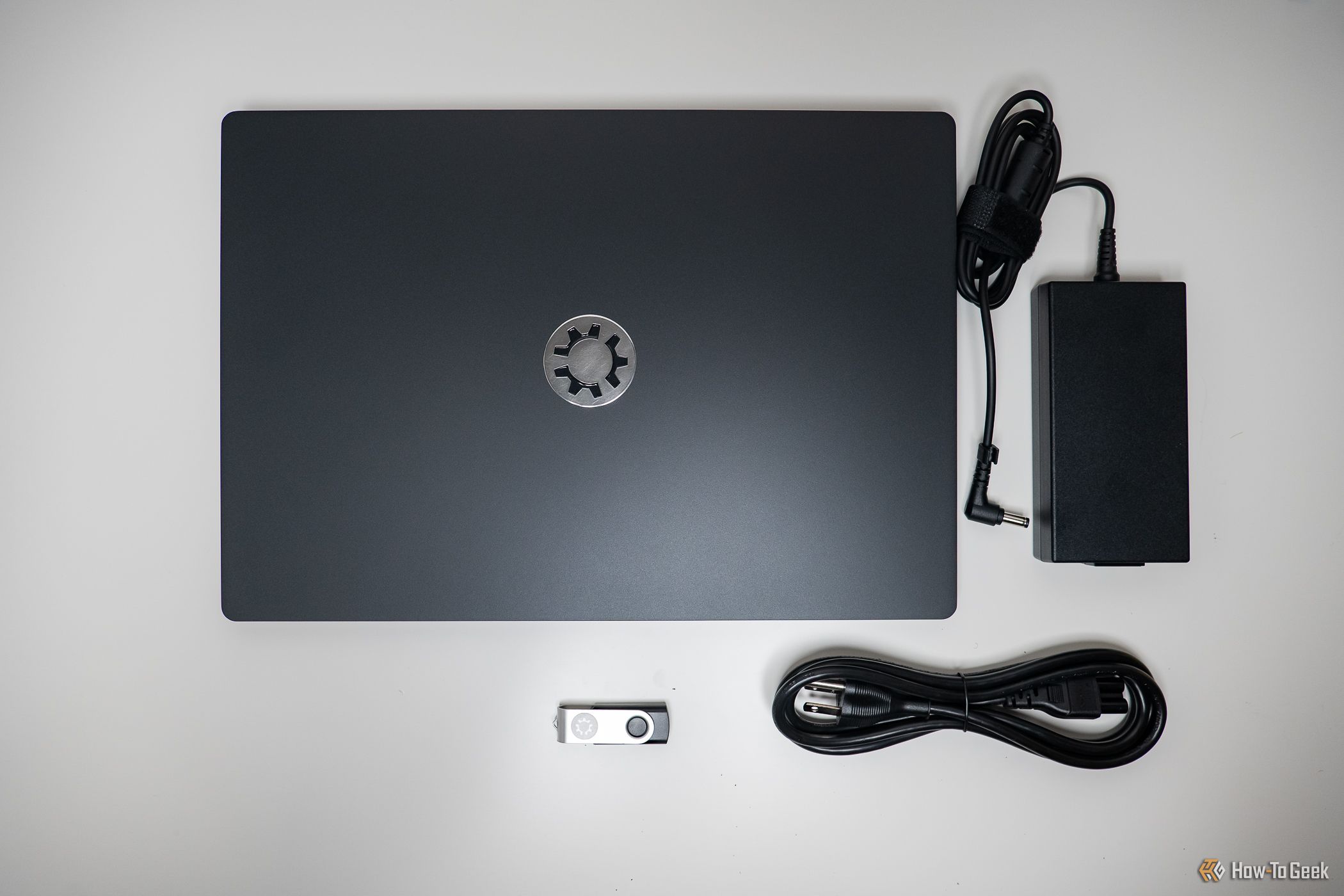
Jerome Thomas / How-To Geek
The aesethic is conservative, not attracting many eyeballs at the coffee shop. The Kubuntu Focus emblem is an optional (paid) addition that looks nice while still matching the utilitarian flow. The structure felt solid, a crucial achievement when designing a user-serviceable laptop like this one. All you need is a standard Phillips-head screwdriver to pop it open for service, and unlike the Ir14 Gen 1 I reviewed, the underplate relievedly never felt loose. The exterior is made of magnesium alloy, which stayed mostly free of fingerprints. The glass touchpad was a different story, though, which needed frequent wiping down to avoid looking greasy.
That said, the touchpad worked well for me with the default settings, and the keyboard, featuring a Kubuntu logo on the “Windows” key, was nice and wide. I’m used to a more compact arrangement, so it took some getting used to, especially the number pad and directional pad. The function (Fn) key layout irked me a little, though. There are two separate backlight Fn keys at F6 and F7, one for increasing the white backlight and one for decreasing. With only three options (off, dim, and bright), two separate keys felt like overkill. Why not just have one cycle through the three modes? I would have liked the second as a media pause/play button instead.
The 2W speakers were nothing to write home about. They’re located on either side of the laptop and point downward, which meant I needed to be set on a flat surface to sound decent; shifting to the couch would muffle the sound. I typically needed the volume set between 70 and 90 just to hear comfortably, and that was in a quiet environment. At 100%, I could hear distortion. Of course, the Focus lineup is meant for development and productivity rather than entertainment. So the speakers work a pinch, but most of the time I far preferred my headphones or external speakers.
Display: A Sensible WQXGA Experience
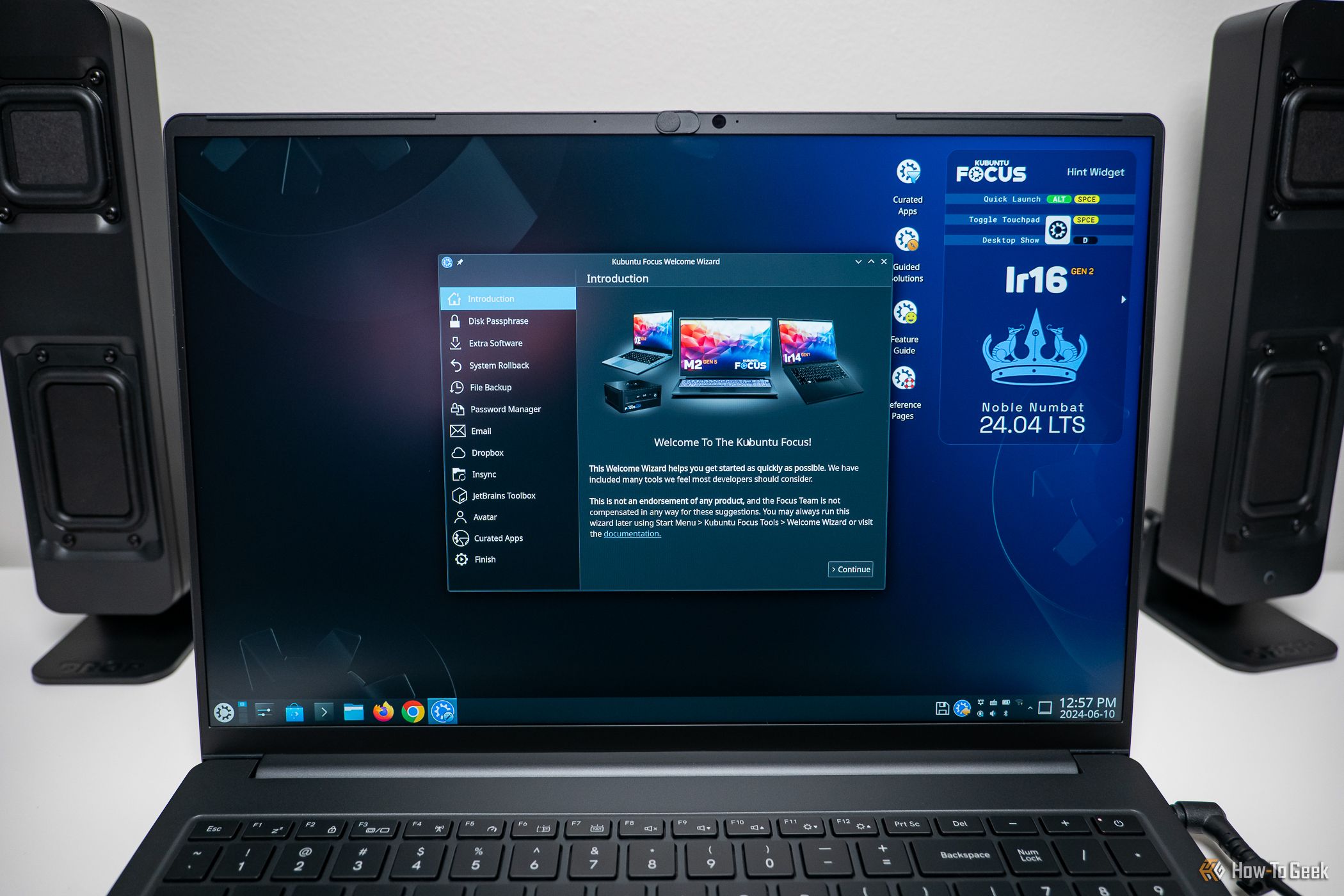
Jerome Thomas / How-To Geek
The Ir16 Gen 2 sports a 16-inch LED IPS panel capable of a 90Hz refresh rate. I was able to comfortably multitask on the 16:10, WQXGA 2,560 x 1,600 screen, with my notes app on one side and a video conference on the other. While the IPS glow was present, I never found it all that noticeable in the environments I was working. Most of the time, things looked crisp. I also had no trouble connecting and using an external display via the HDMI 2.1 port, so for my purposes, I was overall happy with the display hardware and capabilities.
If you have many meetings to attend, plan on investing in a ring light or another good camera lighting solution to go with the Ir 16’s built-in FHD webcam. Unless I was in a room with already stellar lighting, the quality just didn’t compare to that of my Pixel 6’s front camera or the 2020 MacBook Air’s webcam. The privacy shutter is a welcome addition, though.
Ports: The Basics Are Covered
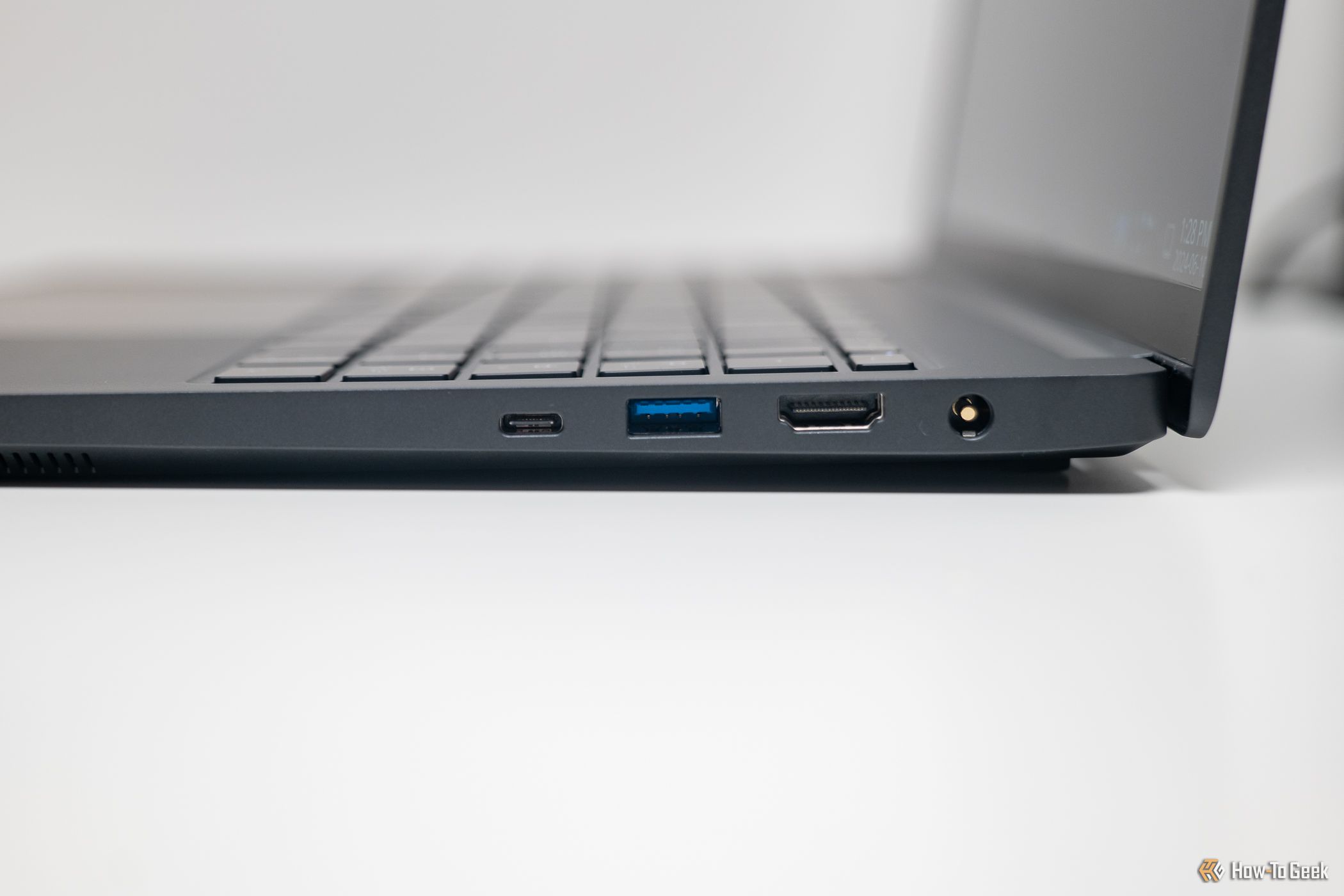
Jerome Thomas / How-To Geek
On the right side you’ve got a USB-C port supporting USB 3.2, Thunderbolt 4, and DisplayPort. It can reach up to 40Gbps, so that’ll be your go-to port. It’s also a 100W DC-IN port, so you can use it to charge (with a powerful enough supply). On that side there’s also a USB-A 3.1 and HDMI 2.1 port.
On the left side is a Kensington lock , another USB-C port supporting USB 3.2, another USB-A 3.1, an SD card reader, and a 3.5mm headphone jack.
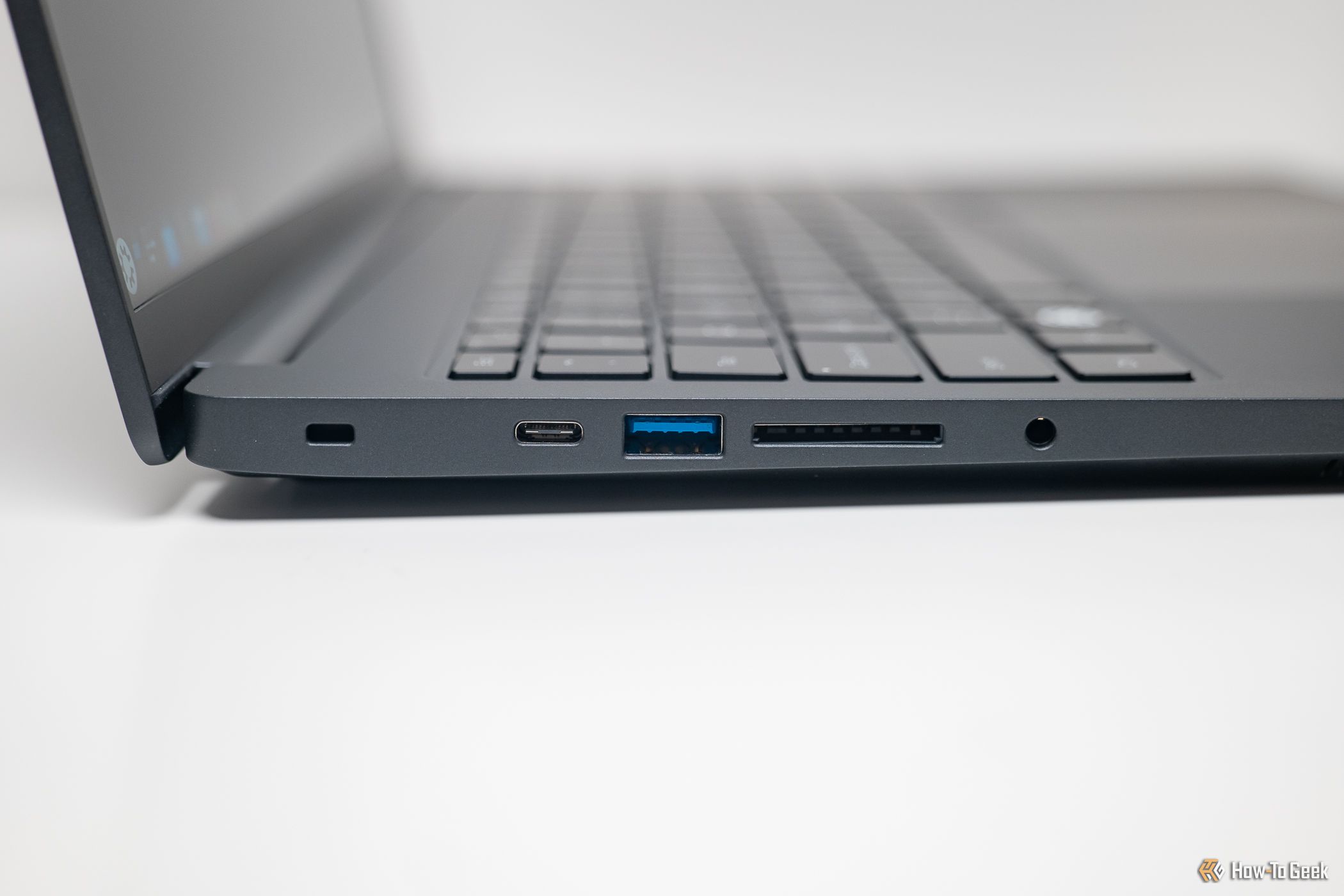
Jerome Thomas / How-To Geek
Notably, there’s no Ethernet port. In the same room as my Wi-Fi 6 router, I was able to get download speeds of 270Mbps and upload 710Mbps. Pretty respectable, considering my connection maxes out at 1Gbps. Connecting a USB-A-to-Ethernet adapter, I had no trouble verging on that 1Gbps ceiling.
Software: Linux Productivity to the Max
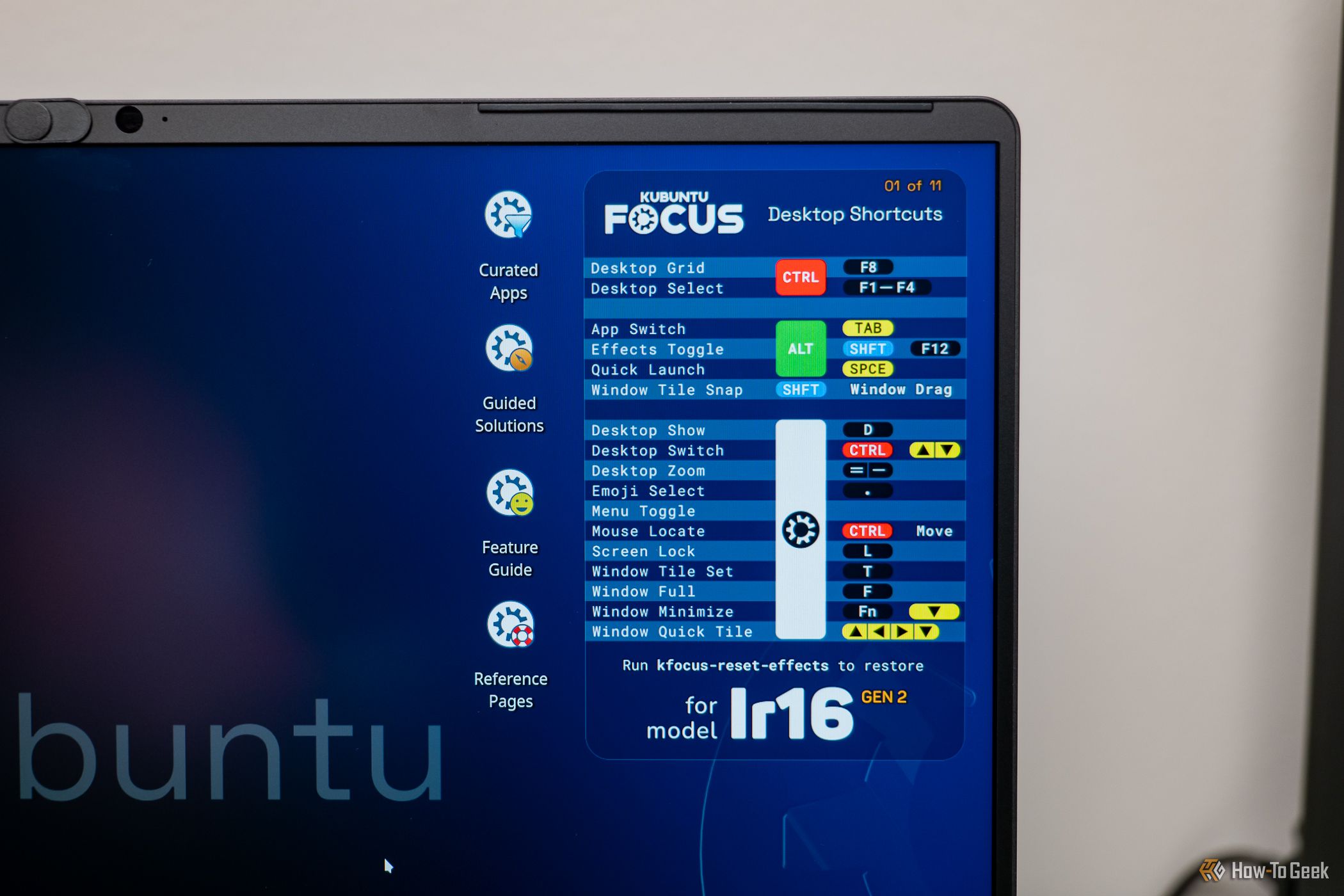
Jerome Thomas / How-To Geek
You can’t write about Linux laptops without talking about the operating system . It’s not Windows or macOS, so if you’ve not used Linux before you’ll need to get used to it. That can be more or less difficult, depending on the distribution (in other words, the version of Linux you’re using). Kubuntu has a bevy of customization and optimization features that are great for a tinkerer like me, but you might find it overwhelming if your needs are simpler. I’ve found other distributions like elementary OS to be a lot less intimidating. The Focus edition of Kubuntu, for its part, goes out of its way to try to guide you through. There’s a setup wizard, as I covered in my Ir14 Gen 1 review , does a lot to help you hit the ground running. The curated apps make choosing software more manageable, and I already prefer the KDE suite of software you get by default, so I felt at home with the Ir16.
One new feature that’s worth noting is the System Rollback tool. One unfortunate update can bork your PC, and I’ve written guides on manually reverting a kernel update , but Kubuntu Focus has a built-in tool for that called System Rollback. It lets you save and restore (and compare) snapshots of your system, saving your kernel, app, and system files (essentially the guts of your operating system). That way, if an update corrupts your system, you can simply “rollback” to the previous snapshot.
Performance: On-Par for Mid-Tier Action
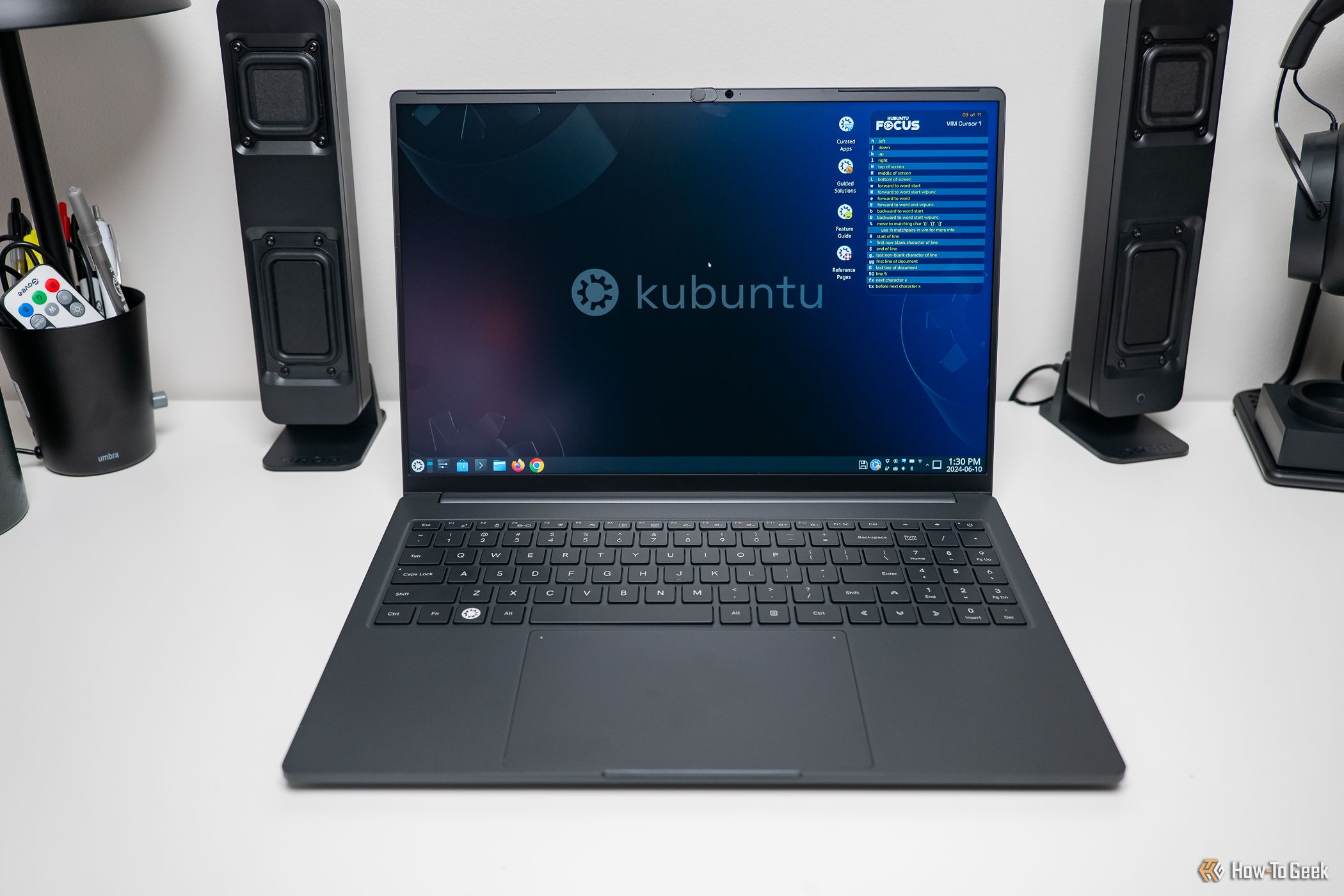
Jerome Thomas / How-To Geek
While the Focus Ir 16 Gen 2 launched in spring 2024, it packs a 13th-generation chip that debuted in early 2023, the Intel Core i5-13500H. So it’s not exactly cutting-edge, and we’re in fact gearing up to see Intel’s 15th generation later in 2024. Still, it’s a respectable processor in the mobile market. Putting it to the test with Geekbench 6 using the “Normal” frequency profile, the Ir16 Gen 2 performed a smidge better than average by scoring 2,590 on a single-core performance and 10,490 multi-core.
Gaming on the Ir16 Gen 2 was doable if I stuck to mid-tier gaming. Testing some limits, I was able to play “No Man’s Sky” at standard settings and HD resolution getting no higher than 45 FPS—playable, but not winning any awards. So long as you game minimally or limit yourself to low-demand games, you can have some fun on the Ir16 along with the productive work. It’s worth noting my review unit came with the 32GB of RAM configuration, so your mileage may vary.
Kubuntu Focus says to expect up to 8 hours of battery life with “modest use” but typical 6 hours. That’s close to what I was getting with the Ir16 Gen 2 on my workload and normal settings. While not quite a full workday, its 80Wh battery seemed to handle my typical note-taking, music streaming, and dozen-tab browsing gracefully. It was able to charge back up within a couple of hours, too.
In terms of fan noise, it generally went unnoticed by me except when processing shaders for “No Man’s Sky.” With the Ir16 Gen 2, you have the option to adjust fan speed in the BIOS , but I never felt the need to.
The Competition: The Ir16 Stacks Up Well
I had trouble finding a better deal than the Kubuntu Focus Ir16 Gen 2 for a Linux all-rounder laptop in the US. Compared to the Dell XPS 9320 Plus or the Lenovo ThinkPad X1 Carbon , both popular laptops you can order with Linux pre-installed , the Focus Ir16 gets you a bigger chassis, higher-res display, and a more powerful chip for almost $300 less. You would miss out on a few perks like a touch display by choosing the Ir16, but you also get a build you can upgrade, so there’s some give and take.
The only serious competition for the Ir16 I could find in the US is the System76 Pangolin . It’s a notebook that comes with Pop!_OS or Ubuntu instead of Kubuntu and an AMD chip that boasts somewhat better benchmarks for close to the same price.
Should You Buy the Kubuntu Focus Ir16 Gen 2?
I felt right at home with the Kubuntu Focus Ir16 Gen 2 , being something of a Linux enthusiast with decent productivity needs and limited gaming habits. That said, I think the better portability of the Ir14 would fit slightly better into my daily life. I’d save a few bucks and feel even more mobile.
Kubuntu is a powerful Linux distro that appeals to tinkerers and power users, though, so I wouldn’t necessarily recommend it to someone who just needs a laptop to browse the internet. Regardless, the Ir16 is hard to beat in terms of value if you’re in the market for a developer or office-focused Linux ultrabook.


Kubuntu Focus Ir16 (Gen 2)
8/ 10
The Ir16 GEN 2 marries the enterprise-class hardware from Carbon Systems with the meticulous OS integration and Linux-first support from Kubuntu Focus.
Also read:
- [New] A Professional's Guide to Precision with MorphVOX Technology
- [New] How to Shoot Vertical Panorama Photos with Your Smartphone Android/iOS
- [Updated] Composing Engaging Podcast Thumbnails
- 2024 Approved Breaking Personal Barriers in YT Content Creation
- 無成本在網路上 MP4 至 SWF 格式過渡 - Movavi 代轉工具
- Conversione Gratuita Da MP4 a ASF Online Con Movavi - Come Trasformare I Tuoi File Video
- Effortless Online M2TS to MP4 Conversion with Movavi - Free Service
- Gratuidade: Converter Imagens RAW Em PNG Online Sem Custo Com O Movavi
- How to Change GPS Location on Vivo Y28 5G Easily & Safely | Dr.fone
- I Migliori Converter Gratuiti MKV in Italia, Disponibili Ora
- In 2024, Streamlined Steps for iOS Voice Recordings
- Meet the Team at Movavi - Learn More About Us
- Movavi
- Navigating Through 2024'S Best Video Editor Applications - A Comprehensive Guide for Selection
- Unbeatable Free Software for MP4 Conversions: Quick, Simple & Effective Media Editing Solutions
- Title: Kubuntu Ultimate Performance on IR16 Gen 2: The Seamless Linux Notebook Experience
- Author: Christopher
- Created at : 2024-12-27 03:39:03
- Updated at : 2025-01-02 23:36:50
- Link: https://some-approaches.techidaily.com/kubuntu-ultimate-performance-on-ir16-gen-2-the-seamless-linux-notebook-experience/
- License: This work is licensed under CC BY-NC-SA 4.0.